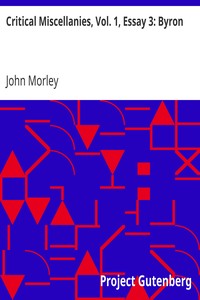| Author |
Morley, John, 1838-1923 |
| Title |
Critical Miscellanies, Vol. 1, Essay 3: Byron
|
| Note |
Reading ease score: 45.4 (College-level). Difficult to read.
|
| Credits |
Produced by Paul Murray, Janet Blenkinship and the Online
Distributed Proofreading Team at https://www.pgdp.net
|
| Summary |
"Critical Miscellanies, Vol. 1, Essay 3: Byron" by John Morley is an analytical essay published in the early 20th century, specifically in 1904. The book serves as a critical examination of the life and works of the poet Lord Byron, exploring his influence within the context of revolutionary thought in Europe and his connections to social and political movements. Morley's work seeks to convey the significance of Byron's literary contributions while addressing misconceptions surrounding his private life. In this essay, Morley delves into the complex persona of Byron and examines how his poetry resonates with the themes of revolution and social change prevalent in Europe during his lifetime. He contrasts Byron with contemporary poets such as Shelley, asserting Byron's unique position as an advocate for human freedom and social justice, which inspired many across the continent. The text also emphasizes the necessity for literary criticism to separate the artist from their personal conduct, arguing that Byron’s artistic legacy should be judged solely on the merit of his poetic output. Ultimately, Morley portrays Byron as a vital cultural force whose works reflect the tumultuous spirit of his era, capturing the perpetual conflicts between individual desires and societal norms. (This is an automatically generated summary.)
|
| Language |
English |
| LoC Class |
PR: Language and Literatures: English literature
|
| Subject |
Byron, George Gordon Byron, Baron, 1788-1824
|
| Category |
Text |
| EBook-No. |
20879 |
| Release Date |
Mar 22, 2007 |
| Most Recently Updated |
Jan 1, 2021 |
| Copyright Status |
Public domain in the USA. |
| Downloads |
90 downloads in the last 30 days. |
|
Project Gutenberg eBooks are always free!
|

